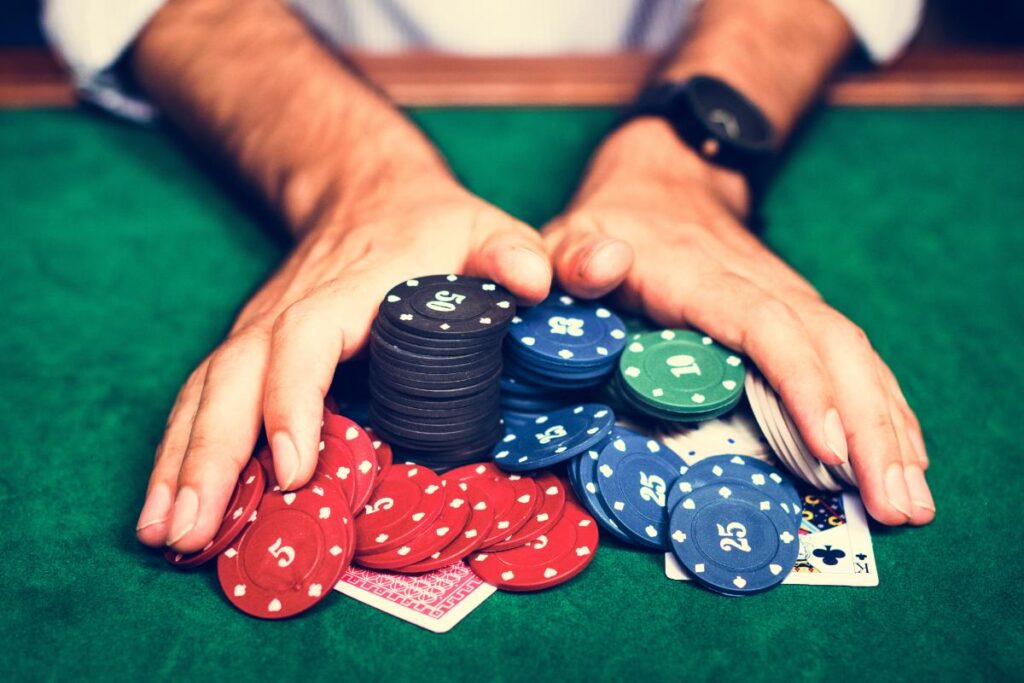Like alcohol or drug addiction, compulsive gambling has distinct phases of progression. Those who gamble are often thrill-seekers and risk-takers and may experience up to five stages of compulsive gambling. At any stage, a person who exhibits signs of compulsive gambling might need professional treatment to prevent potentially serious consequences.
At Promises Behavioral Health, we provide evidence-based gambling addiction treatment services to meet clients’ unique needs. We create an environment conducive to recovery through compassion, understanding, and support. If you or someone you know struggles with gambling addiction, contact us at 844.875.5609.
Overview of Compulsive Gambling
Generally, compulsive gamblers have high intelligence yet low self-esteem. Though they present as confident and forthcoming, they may quietly try to control and manipulate their surroundings. Gambling often starts during their teenage years with horse or dog racing, sports betting, and card games such as poker. As the stages of compulsive gambling progress, these individuals may play slots or video poker as though these games were sedatives.
A person with a gambling addiction can face severe social, emotional, and financial difficulties. Fortunately, knowing more about the phases and signs of compulsive gambling can make it easier for a person to get treatment and recover.
What Are the Stages of Compulsive Gambling?
1. Winning
The winning stage can seem like a dream come true, with the gambler scoring big wins that exceed their monthly or annual salary. In response, compulsive gamblers may spend more and more at casinos and go to gaming establishments more frequently, trying to achieve the same or even better successes. Though they might continue winning for a while, their luck eventually runs out.
2. Losing
Compulsive gamblers spend exorbitant amounts at casinos to score jackpots and prizes or sustain winning streaks. As a result, they may lose far more than they ever gained. During the losing stage of compulsive gambling, an individual may take increasingly desperate measures to recoup losses. They might “double down” on bets and throw caution to the wind while trying to achieve unlikely wins.
During the losing phase, compulsive gamblers may also:
- Borrow money, ask for loans, open credit cards, or dip into savings
- Lie to keep others from knowing the extent of their gambling problem
- Boast about wins without ever discussing losses
Despite mounting evidence otherwise, compulsive gamblers maintain an unwavering belief that this time could be different as they steadily keep losing.
3. Desperation
The desperation stage is a dark period for compulsive gamblers. They become consumed with getting the next bet, trying to beat the system, and regaining losses. Meanwhile, they may feel completely out of control, as though they have no choice but to continue gambling. These dangerous patterns can last months or years, threatening personal relationships and causing ever-increasing financial devastation.
During the desperation phase, compulsive gamblers may:
- Gamble to numb increasing emotional pain
- Become angry and blame others for their problems
- Experience tension at home as a result of gambling
- Tell increasingly elaborate lies
- Engage in illegal activities to get money for gambling
- Have unpaid bills and face significant financial consequences
At this point, the signs of compulsive gambling are often apparent. Friends and loved ones who recognize the issue can help a person with a gambling addiction get into professional treatment.
4. Hopelessness
The fourth stage of compulsive gambling is a devastating point in which the gambler has lost hope. They may feel they have no choice but to end their own life. Others may deliberately pursue illegal activities that lead to incarceration, seeing imprisonment as a form of protection that prevents them from inflicting further harm.
Though the hopelessness phase is challenging and potentially life-threatening, treatment options are available.
5. Recovery
For compulsive gamblers, beating the habit can feel like an epic quest. To succeed, they must come to terms with having a problem and take whatever steps are necessary for recovery. Enrollment in a gambling addiction treatment center is often the first step.
Gambling recovery programs typically use a combination of therapies to encourage total abstinence from gambling. These may include the following:
- Individual counseling
- Group and family therapy
- 12-step programs
Breaking free from gambling means embracing new behaviors and putting forth sincere effort. However daunting such an undertaking seems, it can open new doors towards improving quality of life.
Seek Gambling Addiction Treatment at Promises
If you or someone you know experiences the stages of compulsive gambling, don’t wait to seek help from Promises Behavioral Health. The earlier one gets treatment, the better the chances for successful recovery. Our compassionate staff can answer any questions and customize a treatment plan that works for you.
At Promises, our gambling addiction treatment center provides individualized care in a compassionate and supportive environment. We help people who struggle with gambling addiction address their difficulties and develop healthier behaviors. Call 844.875.5609 or complete our online form to learn more about how we can help.

